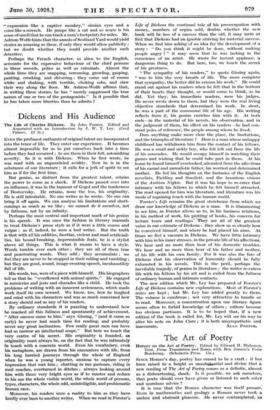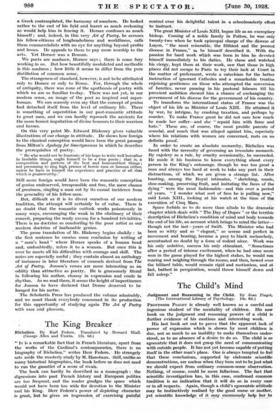The Art of Poetry
Horace on the Art of Poetry. Edited by Edward H. Blakeney. Text, Prose Translation and Notes, with Ben Jonson's Verse Rendering. (Scholartis Press. 15s.) SINCE Horace's day, poetry has ceased to be a craft : it has been raised to a height so unsubstantial and divine that a new reading of The Art of Poetry comes as a definite, almost as a disheartening, shock. Is it possible, we ask ourselves, that poets should ever have given or listened to such sober
and mundane advice ?
It is true that the Roman character was itself prosaic.
Even in mathematics and geology a Roman never took a useless and abstraet, pleasure. -He never contemplated; as a Greek contemplated, the.-harmony of-numbers. He looked rather to the end of his field and learnt as much reckoning as would help him in fencing it. -Horace confesses as much himself ; and, indeed, in this. very Art of Poetry, he accuses his fellow-citizens of longheadedness - and worldliness, calls them commercialists with no eye for anything beyond profits and losses. He appeals to them to pay more worship to the arts. Yet Horace was a Roman.
We poets are madmen, Horace _says ; there is some fury working in us. But how beautifully modulated and methodic is this madness ; how little it seems' to differ from the pure distillation of common sense.
The strangeness of standard, however, is not to be attributed only to Horace or only to Rome. For, through the whole of antiquity, there was none of the apotheosis of poetry with' which we are so familiar to-day. There was not yet, in our
modern sense, an image of the poet as inspired and super- human. We can scarcely even say that the concept of genius had detached, itself from the level of ordinary life. There is something of superstition in our post-romantic attitude to great men, and we can hardly reproach the ancients for the more honest imputation of divine honours to their warriors and heroes.
On this very point Mr. Edward Blakeney gives valuable illustrations of our change in attitude. He shows how foreign to the classical conception would have been the great passage from Milton's Apology for Smedyninuus in which he describes the prerequisites of poetry.
" He who would not be frustrate of his hope to write well hereafter in laudable things, ought himself to be a true poem ; that is, a composition and pattern of the best and honourablest things ; not presuming to sing high praises of heroic men or famous either, unless he have in himself the experience and practice of all that which is praiseworthy."
Still more foreign would have been the romantic conception of genius undeserved, irresponsible and free, the mere chance of greatness, singling a man out by its casual incidence from the generality of his fellow-men.
But, difficult as it is to divest ourselves of our modern tradition, the attempt will certainly be of value. There is no doubt that the romantic outlook works poisonously in many ways, encouraging the weak in the obstinacy of their conceit, preparing the ready, excuse for a hundred trivialities.
There is no doctrine so comforting to the poor artist as our modern doctrine of inalienable genius.
The prose translation of Mr. Blakeney begins shakily : in the first sentence he creates some confusion by writing of a " man's head " where Horace speaks of a human head and, undoubtedly, refers it to a woman. But once this is over he meets all his difficulties with courage and skill. The notes are especially useful ; they contain almost an anthology of instances in later literature of counsels derived from The Art of Poetry. Jonson's verses are more interesting as an oddity than attractive as poetry. He is gruesomely literal in following his author, clumsy in expression and crude in rhythm. As we read them, it seems the height of impertinence for Jonson to have declared that Donne deserved to be hanged for his metre.
The Scholartis Press has produced the volume admirably, and we must thank everybody concerned in its production for this opportunity of studying again The Art of Poetry with ease and pleasure.









































 Previous page
Previous page